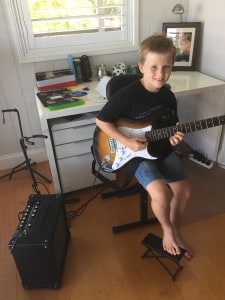8 Tips To Better Guitar Practice
So, you play the guitar and you want to get better at it. You already go to your lesson every week but you feel as though you could be improving faster. If only you didn’t find guitar practice to be so boring! When a lot of people think of guitar practice, they immediately think of running scales and exercises for hours on end, and that can be a huge turn-off to the idea. Thankfully, guitar practice doesn’t have to be boring – it can actually be fun!
1. Include technical work, but don’t overdo it
Some people love technical exercises. If you don’t like them much at all, that’s no problem. Do one or two, only do them a couple of times, and do them first. Your guitar practice will be much more effective when there is technical work included, and you’re getting that in and getting it out of the way before you can spend as long as you want on the fun stuff. If you’re stuck for which one to do, have a look at your resources checklist on your journal page and see what you did last and what’s next in line.
2. Play things you like
Enjoy your guitar practice. If you really like technical work, play more of it. Play as much of it as you want. If you aren’t so keen on the exercises, get your one or two out of the way and get into playing some songs. Pick songs you like. If the one that you’re currently working on is getting you frustrated, have a bit of a go then move on. Play something from a few weeks ago to keep it fresh. Try learning a song that you’ve heard lately or one that you’ve always liked.
3. Time trials
Time trials are a hugely underrated part of guitar practice. The best way to build up speed on the guitar is to repeat, and repetition often leads to monotony. Instead of endless metronome practice, try timing yourself. Try to see how quickly you can play all the chords in the phrase that’s bothering you, or see how many times you can switch between two irksome chords in 30 seconds or a minute. Not only can they be a real hoot, but they also give you a means to quantify your improvement.
4. Don’t force it
There are going to be days where you really just don’t feel like picking up the guitar. There are going to be days where you’ve been at work or school and you’re exhausted and guitar is the last thing on your mind. This is life, and that’s okay. You don’t have to practice every day. If playing the guitar at all today is going to be a huge hassle, then don’t do it. You’ll probably achieve negligible gains, and forcing it too often will breed resentment for the guitar and build up a negative predisposition towards practicing, which will impact your ability to enjoy practicing on your good days.
5. Play with a friend
Guitar practice is that thing you do by yourself, right? Not necessarily! Practising with a partner can be hugely beneficial, and it can be really enjoyable. Not only can you bounce ideas off each other, but you can compare techniques, discuss possible things to learn in the future, and can even compare scores in time trials. Trying to play songs together isn’t just a good way to build ensemble skills and improve your timing, but it’s also the essence of what music is. The social aspect of music is one of its best qualities, and you can’t really benefit from that without playing with others. If you’re not in a band, then practising with a friend is the best way to do that.
6. Make a video or other recording and share it
Recording yourself is becoming easier and easier as technology improves. You can easily record decent video and passable sound on your phone, and can get a decent quality recording setup for your computer quite cheaply. Making a video or a recording can be a really fun experience. Use whatever means you have available and record yourself playing something. It doesn’t really matter what it is – any song that you can play well enough and want to show off will do. How you record it will depend on how you’re going to share it. Think of it this way – Instagram has a 15-second video limit, so you only need to be able to play it convincingly for that amount of time or less. Set your phone up and have a few tries until you get a long enough clip of you playing it flawlessly, cut the video in Instagram, apply a filter, and there you go. It’s surprising how effective this can be for ironing out little issues in particular parts of songs. You will generally want a certain level of perfection for something that you’re going to share – a level that you might not have had the drive to push for otherwise.
7. Do something else while you’re practising
There are traditionalists who would be absolutely mortified that I would even suggest unfocused guitar practice, but it really isn’t such a bad idea, depending on what you’re practising. Mindlessly practising while you watch TV is highly effective for finger fitness exercises (and is probably more interesting than focusing on them), and also for right hand patterns such as strumming and fingerpicking. In these cases it works so well because the distraction of the TV forces you to program your playing into your subconscious, which will make it easier to automate what you are doing.
8. Don’t feel bad if you miss a session
Didn’t practice much this week? Don’t stress. Just go to your lesson and don’t worry about it. Beating yourself up over not practising every day is a negative mindset, which can build up and eventually lead to you giving up to avoid disappointing yourself. (You should read about this here.) They key to avoiding this is to set realistic practice expectations. Don’t forget that you will continue to improve even if you don’t practice at all outside of your weekly guitar lesson.
You continue to play the guitar because you enjoy it. Practising to achieve improvement on the instrument should play into this, rather than be a downside. Think of guitar practice time as an opportunity to continue enjoying your time on the guitar. If you aren’t having a whole lot of fun when you practice, try out a few of these tips to rekindle the spark and have fun whenever you’re holding the guitar – whether you’re on stage, in a lesson, or practising.

